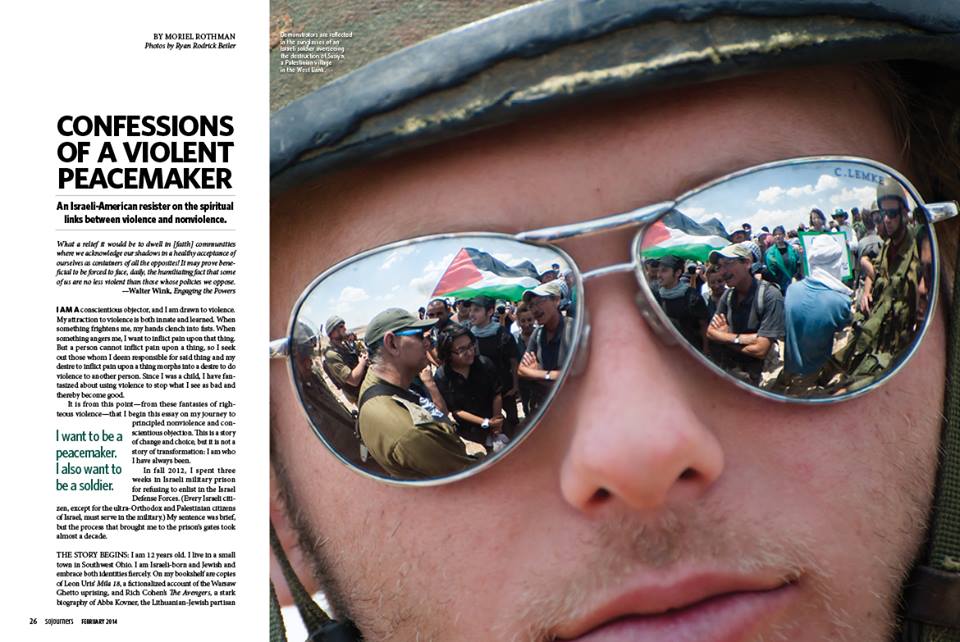Confessions of a Violent Peacemaker
by Moriel Rothman | February 2014
An Israeli-American resister on the spiritual links between violence and nonviolence.
What a relief it would be to dwell in [faith] communities where we acknowledge our shadows in a healthy acceptance of ourselves as containers of all the opposites! It may prove beneficial to be forced to face, daily, the humiliating fact that some of us are no less violent than those whose policies we oppose. —Walter Wink, Engaging the Powers
I AM A conscientious objector, and I am drawn to violence. My attraction to violence is both innate and learned. When something frightens me, my hands clench into fists. When something angers me, I want to inflict pain upon that thing. But a person cannot inflict pain upon a thing, so I seek out those whom I deem responsible for said thing and my desire to inflict pain upon a thing morphs into a desire to do violence to another person. Since I was a child, I have fantasized about using violence to stop what I see as bad and thereby become good.
It is from this point—from these fantasies of righteous violence—that I begin this essay on my journey to principled nonviolence and conscientious objection. This is a story of change and choice, but it is not a story of transformation: I am who I have always been.
In fall 2012, I spent three weeks in Israeli military prison for refusing to enlist in the Israel Defense Forces. (Every Israeli citizen, except for the ultra-Orthodox and Palestinian citizens of Israel, must serve in the military.) My sentence was brief, but the process that brought me to the prison’s gates took almost a decade.
THE STORY BEGINS: I am 12 years old. I live in a small town in Southwest Ohio. I am Israeli-born and Jewish and embrace both identities fiercely. On my bookshelf are copies of Leon Uris’ Mila 18, a fictionalized account of the Warsaw Ghetto uprising, and Rich Cohen’s The Avengers, a stark biography of Abba Kovner, the Lithuanian-Jewish partisan who battled the Nazis during WWII and helped lay plans to poison German citizens and POWs after the war.
I am in a field with several other boys. It is snowing. We are fighting.
“Stop!” Devon yells. “Stop, stop, stop!” His lips are quivering and his wide brown eyes are wet like his face, glossed with tears and melted snow. He is three years younger than we are, and slender. He is imploring Karl to stop throwing snow into his face, but Karl does not stop. Karl is older, heavier, and something of an outcast. I see this and think: This is wrong. Karl is bigger, Devon is smaller. Karl is white, Devon is black. Karl is bad, Devon is good. I run over and leap onto Karl’s back, pulling him into a headlock and backward onto the ground. We fall, and then Karl turns over, raises his fist, and punches me in the mouth. My friends rush over and begin kicking Karl in the side. He gets up and runs off. He makes a sound that may be described as whimpering.
I am not very strong, and especially after the fight with Karl, not very brave. I want to be brave, though, and I want to be strong, and I want to be heroic, and I want to be good. On my bookshelf next to Uris and Cohen is a book of letters by Yonatan Netanyahu (brother of Israeli Prime Minister Benjamin Netanyahu), who was killed as he led a raid on the Entebbe airport to rescue a hijacked plane filled with Israelis from Idi Amin’s grasp. On my wall is an Israeli flag. On my Discman is an Israeli rapper named Subliminal, whose lyrics glance over heavy beats and between exhortations to dance and forceful declarations of nationalism. On my life’s to-do list: Enlist in the IDF.
This “to-do” item, while perhaps somewhat unique in its intensity, did not arise in a vacuum: From Zionist summer camps to Jewish federations, from NGOs such as Friends of the IDF to Birthright trips, the Israeli military is revered by much of the established American Jewish community—as well as by many segments of the American Christian community. Israeli army service is often portrayed as the ultimate way to contribute to the Jewish people’s wellbeing.
THE STORY CONTINUES:
To read the rest of the essay online, please visit the Sojourners site: http://sojo.net/magazine/2014/02/confessions-violent-peacemaker

